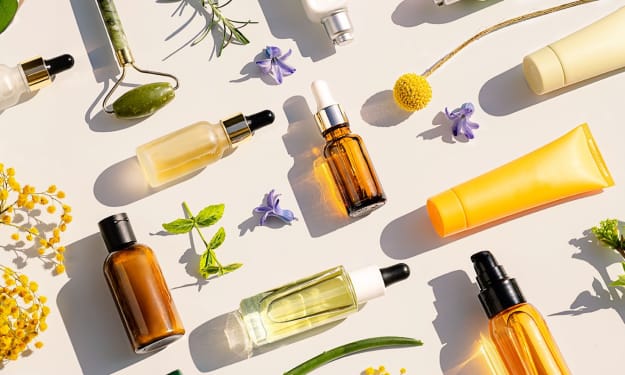Foods to Support Healthy Skin
The first thing people notice about you is your skin. Surprisingly, it ranks right up there with the lungs, liver, and intestines as the largest organ in the human body. It performs a variety of functions, including creating vitamin D from sunshine and serving as our first line of protection against the environment and pathogens. The layer of fat beneath the skin's surface contributes to keeping our bodies' vital fluids contained.

The interesting thing about skin is that young people's top skin-related concern may be how to tan. But as we age, avoiding wrinkles becomes our top skin goal.
When does it become critical to begin caring for your skin, then? You need to get up earlier than you think. Beginning in your teens, Mark G. Rubin, MD, assistant clinical professor of dermatology at the University of San Diego, thinks that quitting smoking and staying out of the sun will pay off in the long run.
The earlier you begin, the better, he advises, as prevention is key to delaying the aging process of the skin. "A lot of damage has already been done by the time you notice changes in your skin that you don't like."
If you stop to think about it, what we're really attempting to do is postpone skin's natural aging process, which happens to all organs as they age. Preventing body cells from oxidizing is the best strategy to delay many aspects of cellular aging in the human body. And experts agree that the greatest approach to prevent your body from unnecessarily oxidizing is to stop smoking and eat a diet high in antioxidants.
Physically, maintaining well-hydrated skin with a nice layer of lipid (fat) beneath the skin to protect the internal moisture is the greatest strategy to slow the look of skin aging. According to some experts, you can achieve this in part by following a nutritious diet that includes "smart" fats like omega-3s and monounsaturated fat, getting plenty of rest, and taking care of your skin to prevent moisture loss. The key is to maintain healthy skin on the inside and out.
Good nutrition, sufficient sleep, lowering stress, maintaining hydration levels, and other factors all contribute to having skin that looks better, according to Rubin.
The American Academy of Dermatology member G.G. Papadeas, DO, adds "no excessive drinking" (of alcohol) to this list of good habits.
In order to increase your chances of having good skin, what meals should you choose? Continue reading for a list of nutrients that are good for the skin and foods that are high in them.
TruSkin Vitamin C Serum for Face
1.Antioxidants
The main antioxidants (vitamins A, C, and E) are thought by many dermatologists to reduce the risk of UV damage and other environmental toxins by neutralizing "free radicals," unstable chemicals that harm cells and are responsible for wrinkles.A vitamin A recent Dutch research of healthy men and women discovered a strong correlation between skin quality and blood levels of vitamin A. You're most likely to receive too much vitamin A from supplements than from foods high in carotenoids, therefore it's best to get your carotenoids (phytochemicals that your body converts to vitamin A) from foods.
Carrots, pumpkin, sweet potatoes, butternut squash, mangoes, spinach, cantaloupe, greens, kale, Swiss chard, and tomato-vegetable juice are some of the best sources of vitamin A in food.
C vitamin. Only in its active form, which is the same form you get from food, is vitamin C a powerful topical (that is, on-the-skin) antioxidant. Naturally, it is beneficial for your health to include foods high in vitamin C in your diet on a daily basis.
Orange juice, grapefruit juice, papayas, strawberries, kiwis, red and green peppers, cantaloupes, tomato-vegetable juice, broccoli, mangoes, oranges, Brussels sprouts, cauliflower, and kale are some of the best food sources of vitamin C.
E vitamin. More research is being done on the potential advantages of vitamin E as a component of skin-care products, but as of right now, it appears to work best as a skin conditioner.
Vegetable oils, nuts, seeds, olives, spinach, and asparagus are some foods that are rich in vitamin E. However, it's challenging to eat enough of this vitamin, so many individuals take a supplement. (To avoid consuming too much, limit your intake to no more than 400 international units per day.)
2. Opt for "Smart" Fats
Omega-3 fatty acids, which are good for the heart and joints, might also be good for the skin. Several recent research on fish oil supplements suggest that the omega-3s in fish may assist to protect against sun damage.
Anti-aging expert Nicholas Perricone, MD, author of The Wrinkle Cure, has advocated a diet rich in antioxidants and omega-3s for better skin, says Rubin, "and there is some scientific data to support that type of diet."
It makes sense to boost your consumption of foods high in omega-3s despite the fact that there is still much to learn about the advantages and disadvantages of fish oil supplements.
Fish, ground flaxseed, walnuts, and omega-3-enriched eggs are some of the best sources of omega-3s in food. You can also improve your intake by switching to a cooking oil with a greater omega-3 content, such as canola oil.
The Dutch study mentioned above for its conclusions regarding vitamin A also discovered that monounsaturated fats are linked to a healthy skin pH. (the balance between acidity and alkalinity that is important for healthy skin).
Olive oil, canola oil, almond oil, hazelnut oil, avocados, olives, almonds, and hazelnuts are some of the best nutritional sources of monounsaturated fats.
3. Consume real foods
According to Dr. Wilma Bergseld, director of dermatological clinical research at the Cleveland Clinic in Ohio, she makes it a point to advise her patients to follow a healthy diet consisting of whole foods. The same diet that guards against heart disease and cancer is beneficial for the skin, she emphasized in the email.
With a recent study, Australian researchers from Monash University may have contributed to demonstrating Bergseld's point. The diets of roughly 450 persons from Australia, Greece, and Sweden, aged 70 and older, were examined by the researchers. They discovered that people with diets high in whole milk, red meat (especially processed meats), butter, potatoes, and sugar had more wrinkles and premature skin aging than people with diets high in "whole foods" like vegetables, fruits, legumes, eggs, yogurt, nuts, oils rich in monounsaturated fats, multigrain bread, tea, and water.
The antioxidants, phytochemicals, and monounsaturated fats that a "whole foods" diet provides may be the cause of this, according to the experts.
About the Creator
Januka Rathnayaka
Exercising regularly, every day if possible, is the single most important thing you can do for your health.






Comments
There are no comments for this story
Be the first to respond and start the conversation.